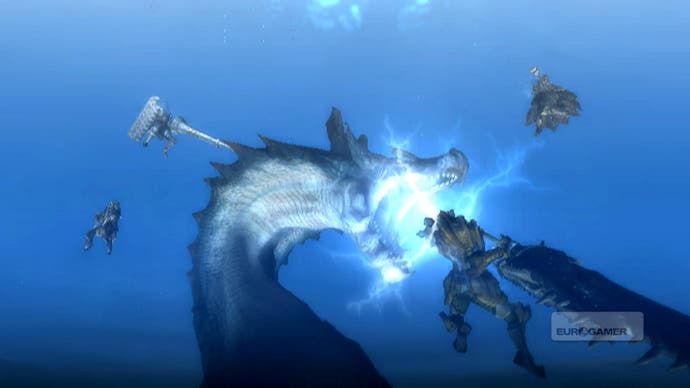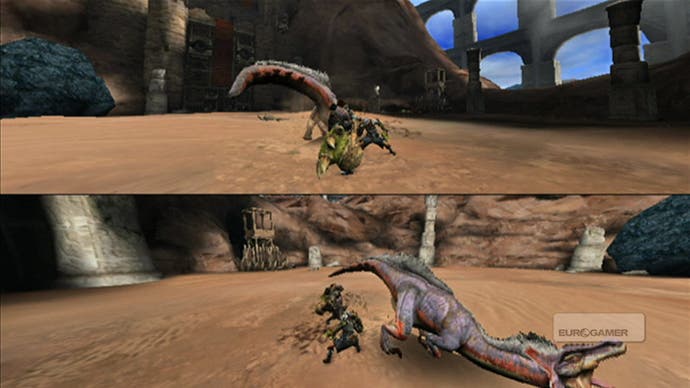Monster Hunter Tri
Tri force.
In many ways it's similar to an MMO's crafting mechanics, farming missions until you can make the kit which lets you go on to bigger and better things. The scope for experimentation is immense, with no clear 'best' sets to collect, instead encouraging the preferences and play-styles of individuals.
The single player begins in Moga Village, the colourful hub of operations where all of the vital preparation occurs between quests. To begin with it's a sparsely populated place, traumatised by recent earthquakes and monster infestations, with only basic shopping amenities available. Over the course of the next few hours, successful questing will see the introduction of the various different support systems and facilities which make the mutually dependent network of harvesting, crafting and hunting possible.
Like Freedom Unite, there are shops for basic provisions, as well as a forge, quest givers and a kitchen serving stat-boosting cuisine. Where Tri diverges from previous titles is in its new system of resource points and commodities.
Attached to Moga Village, and the only available area to begin with, are the Moga Hills - a varied and relatively timid environment where you can gather basic resources and encounter a few of the less lethal creatures. Questing here isn't like the traditional mission structure, with a set goal ending your session. Instead, it's free-form, allowing the player to wander indefinitely, as long as health, stamina and inventory space allows. Take a BBQ spit for roasting monster meat and everything else you'll need to survive can be gathered from Tri's newly regenerating resource points.

When you do decide to return to the village, the monsters you've killed and some of the items you've collected can be converted to resource points. These are the currency used to perform various village functions, notably the dispatch of the fishing boats and duties on the farm.
The farm will be familiar to fans - it's basically a way of cutting much of the grind out of essential resource production, allowing players to automatically maintain levels of basic materials without heading out on specific gathering quests. Meanwhile, pick a destination for the fishing fleet, fuel them with resources and special items and they'll trundle off and gather materials for you, many of which can't be picked up anywhere else. These fishing trips, and the growth of crops on the farm, take time, incorporating Tri's new day/night system. Each time a quest is completed, or a substantial Moga hills excursion undertaken, half a day passes and these systems all advance.
For players of the previous games, it's a system which takes some getting used to, but for newcomers it's a great way to encourage the proper time and resource management which makes a good player.

As for the quests proper, not a great deal has changed on the surface. Generally it's still you against both a set of monsters and the clock, with gathering quests and hunts for smaller enemies giving breathing space between the more involved missions to kill the bigger beasties. Tougher enemies still invariably involve several attempts, learning attack patterns, behaviours and weaknesses. They're still unforgiving and demanding - although perhaps a little less so during the earlier stages.
There are some significant changes in the subtleties, however, which have added a great deal to the experience. Sub-quests, for example, now prod the player in the direction of advanced techniques, rewarding hunters for cutting off tails or using traps. They're not mandatory, but you'll reap greater financial and material rewards if you do complete them, and they're often there to help point out the best way to go about a mission.









